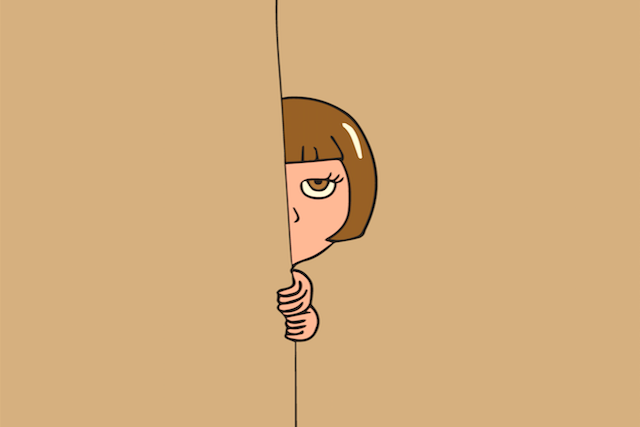
“Whether you think you can, or you think you can’t, you’re right.” ~Henry Ford
Self-doubt is a killer. It may start off quietly in the back of your mind when you’re a kid. You may not even notice its presence, but if you let it, it can keep growing bigger and bigger like a balloon that never pops.
“Did I make the right decision?”
“Should I have said that out loud?”
“Should I apply for that job?”
“Am I good enough?”
For most (including myself), it’s that last question that haunts you no matter what you’re trying to do.
Growing up, my self-doubt tiptoed into my mind by silently questioning my dancing. After I satisfied my inner critic by quitting dance practice, it moved on to question my grades, my personality, and everything else about myself.
Fast-forward to my mid-twenties, and my self-doubt grew considerably in size. Amped with a larger space in my mind, my self-doubt attacked my writing and my job as a writer and questioned if my articles were even worth reading.
The belief that I wasn’t good enough stopped me from sharing any of my work with my friends and family. It stopped me from even looking at my own articles.
Over the next few months, I went on to write about twenty opinion pieces on global politics, none of which were a source of pride for me, because that is what I told myself.
A few months after I quit my job to focus on personal health issues, I decided to go back to the website that published my work. “Maybe I can look at my writing with a fresher perspective,” I thought.
Unfortunately for me, the company that I’d worked for decided to change their business model and redirect their efforts to create an app. All my articles had been wiped clean. Months of hard work, research, and slaving away over 700-word articles vanished at the click of a button.
“Why didn’t I save any of this?” I asked myself. Because my self-doubt told me it wasn’t worth saving.
It was only then that I realized, every hobby, passion, or profession I’d tried had been stunted by my own debilitating inner monologue. Moreover, I had failed to recognize that even if my articles weren’t “good enough” by someone else’s standards, they were still mine. They were still a product of my mind and tangible proof that I had ability to create something despite the obnoxious voice in my head.
At first I thought, “What am I doing that keeps making that bubble grow bigger?” But I already knew the answer. I was feeding it. Right from the moment I quit dancing, my doubt bubble began growing bigger and bigger till it became the only thing I knew.
I’m currently in the process of restarting my work, hobbies, and passions, with a different mindset. Here are some of the things that have immensely helped me change the way I perceive myself and my work.
1. Keep showing up.
Your doubt grows bigger every time you let it win. Every passion you give up, every offer you decline because you think you’re not equipped to handle it, only fuels the machine that produces more self-doubt.
Stop yourself from going round and round the vicious cycle by understanding that even if you’re not good at something today, that does not mean that you will not be good at it tomorrow. I can’t stress enough the importance of keeping at something every day. No one starts at their best; they build to it. So show up, do it again, then do it again, and your defeatist inner voice will quiet over time. Nothing slows down that inner monologue faster than being aware of its presence and choosing to ignore it.
2. Focus on your successes, not your failures.
Many of us fail to see all we’ve accomplished in our lifetime because we let our failures eclipse our achievements. For me, my mind would shine a light on the missteps in my dance practice, the mistakes in my writing, pinpointing and ridiculing even the smallest of grammatical errors.
Only upon closer inspection of my own thoughts did I begin to notice the pattern of ‘selective memory,’ where the humiliating, humbling, and haunting memories of failure and shame were constantly at the forefront of my brain.
Now, I consciously and purposefully shine a light on the hours of effort, focus, and perseverance it took me to even get this far. I remember that, good or bad, I didn’t give up. Like everything else, it takes a bit of practice. The reward? The warmth of the realization that you are not your mistakes.
Instead of reminding yourself over and over how you’ve fallen short, hold on tightly to the things you’re proud of. Keep reminding yourself of the things you’ve excelled at, because your focus will guide your choices.
If you berate yourself for your failures you’ll feel too scared to try anything new. If you celebrate your successes you’ll feel empowered to keep doing your best.
3. Trust the journey.
For me, comparison has always been the biggest killer of ambition. When I think I’m not good enough, it’s often because I’m comparing myself to someone who’s made strides in their own journey.
What I fail to realize, every single time, is that everyone’s journey is different. You don’t know where someone’s been and you also don’t know where they’re going. You don’t know how many ‘failures’ came before their success, or if they even feel successful in the life they’re living now.
As cliché as it sounds, trusting your journey (failures and all) is an integral part of dissolving self-doubt. All you need to do is focus on moving forward in your own journey, trusting that you’re always where you need to be, moving at the best pace for you, learning the lessons essential for your own growth.
If you stop yourself from moving just because someone else seems to have gone further, you will never know how far you can go.
—
I lost my articles because I didn’t see the value in my work, because I thought it wasn’t good enough. I now know that they were proof I was trying—which is the only way to learn and grow. And realizing I’m learning and growing helps me move forward in spite of my doubt.
About Aashna Sanghvi
Aashna is a twenty-four-year-old writer from India. Focused on writing articles on global politics, she is now venturing into writing about spirituality and philosophy. Aashna graduated with a business management degree and hopes to write a book on personal growth/ healing and self-help. Additionally, she enjoys scuba diving and mindfulness meditations.












 Though I run this site, it is not mine. It's ours. It's not about me. It's about us. Your stories and your wisdom are just as meaningful as mine.
Though I run this site, it is not mine. It's ours. It's not about me. It's about us. Your stories and your wisdom are just as meaningful as mine.
Thank you…..sometimes you wait for ahh hah moments. This was one that opened my eyes.
Incredibly insightful and encouraging. Right on time in so many ways. Thank you.
Nice article. This dysfunction of mind can be exacerbated by over demanding parents and others. Because I grew up with a club foot and had a unique name I was constantly ridiculed and made to feel like a freak. I knew I wasn’t and never let all the abuse of the past make me into something I wasn’t. Unfortunately having grown up with this, I always assumed everyone is my enemy. I can see in my life there were genuine people who saw the good in me, yet I would drive them away thinking they were being deceitful so they could harm me. I realise this post doesn’t parallel this story exactly, but in a way “Not being good enough” relates on many different levels.
Sadly I still have NO doubt about not being good enough! I know that I am not good enough—have been told this so often my belief in its truth is deeply cemented within me!
Maybe you were not good at the THINGS you tried to do, and that doesn’t mean you’re not good enough as a person. You can just find other things you are good enough at. I don’t think the people who told you that you are not good enough couldn’t have cared enough about you or even know you well enough to tell you that!
Thank you for sharing this. My self-doubt or the negative self critic as I like to call it in my head has been overbearing for the past few months. Hoping I can focus on these 3 things to get me out of this state.
TY Jane! It wasn’t/isn’t about my being good at doing things! It was and still is that I still don’t feel I’m “good” person! It was my father who impacted on/in me how worthless I am!!! One of the 2 most important people in the world at your birth…..one of which, my father, denied my being and almost totally ignored me!!!
I am so sorry this happened to you. I had a dysfunctional upbringing as well. My Step-father was really abusive and one of the ways he did it was ignoring me. After years of letting my past continue to hurt me and hold me back I found an organization called ACA that really helped me. It stands for Adult Children of Alcoholics but it’s also for adult children of dysfunctional family’s. I had given up hope of ever healing until I found this program. It’s like AA 12 step but with the goal of emotional sobriety. There are meetings but so far I am just reading the book. There is hope for healing. It took me 16 after leaving my parents house to find it but I’m glad I gave it a chance.
Beautiful article. I really needed to read it at this exact moment in my life. I’m glad you silenced that destructive inner-voice in order to write this eloquent post.
Great article. It was just what I needed this morning. Thank you.